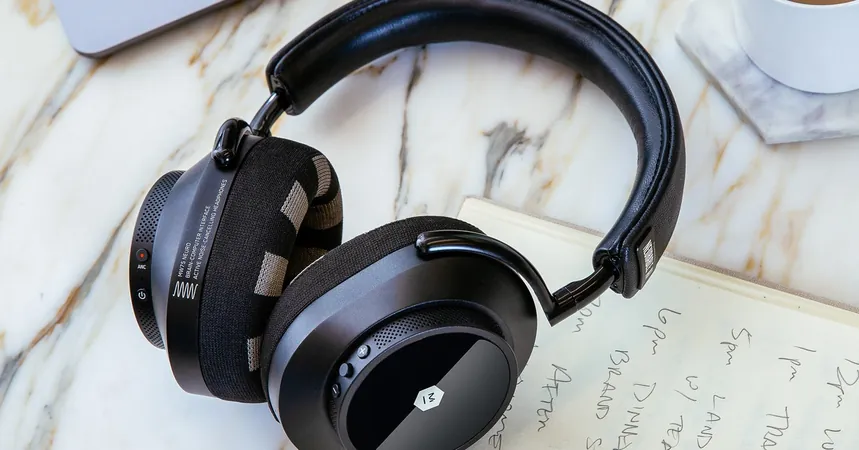
I Tried the Revolutionary MW75 Neuro Headphones That Claim to Boost Focus – Here’s What Happened
2024-09-24
Activity trackers have evolved far beyond simple step counters. Now, they assess various health metrics, including heart rate, blood oxygen levels, and even sleep apnea detection. Enter the latest innovation: brain-tracking headphones that promise to enhance your focus. I've been testing out the MW75 Neuro headphones by Neurable for the past two weeks, and it’s been nothing short of fascinating.
Recently launched by Boston-based Neurable, these cutting-edge headphones utilize electroencephalography (EEG) technology and artificial intelligence to monitor brain activity and focus levels. The concept is simple yet intriguing: by analyzing brain waves, the device aims to help users fine-tune their work habits to boost productivity. Priced at $699, the MW75 Neuro is available for preorder in the U.S. and will hit the market this fall, with plans to expand to Europe by spring 2025 at €729 and £629 in the UK.
According to Ramses Alcaide, CEO and co-founder of Neurable, these headphones have been designed to be an everyday wearable that manages mental wellness and prevents burnout. "We’ve created the ultimate wearable that tracks the most essential organ in your body—your brain," he stated.
Alcaide's journey into this technology began during his PhD at the University of Michigan's Direct Brain Interface Laboratory in 2011. He co-founded Neurable in 2015 with fellow student Adam Molnar. The MW75 Neuro represents a leap into the realm of brain-computer interfaces (BCIs) for casual consumers, similar to concepts explored by tech giants like Apple, which has filed patents for brain-sensing headphones.
Unlike invasive BCIs that require surgical implants (like Elon Musk's Neuralink), Neurable's device is non-invasive, collecting brain data through EEG sensors placed against the skin. This approach, while less invasive, must tackle the challenges of accurately recording signals through the scalp and skull.
EEG technology has been around since the 1920s and is commonly used in medical settings to monitor brain activity. Traditional EEG setups require a cap filled with electrodes and often involve gels to improve signal quality, making them impractical for everyday use. Neurable aims to change this perception by providing headphones that can comfortably integrate into routine life.
The MW75 Neuro features sleek design and functionality as a pair of noise-canceling wireless headphones equipped with 12 EEG sensors embedded in the earpads. These sensors capture 80 to 90 percent of the EEG data of conventional setups, proving useful in both music playback and focus tracking. The device assesses different types of brain waves—like alpha and beta waves—that correspond to mental states of relaxation and focus, respectively.
In preparation for my trial, I experienced firsthand how the technology functions during a demo at SXSW. While concentrating on numbers displayed on a screen, I noticed the real-time visualization of my brain activity reflected peaks and troughs correlated with my focus levels. It was a striking representation of how my concentration fluctuated, akin to monitoring heart rate.
The user experience extends into simple daily tasks. After receiving the headphones, I paired them with the accompanying app to start recording brainwave data in different focus scenarios—work projects, studying, or relaxing. I found that it took some practice to adjust the earpads correctly for an optimal reading but achieved better results as I became more familiar with the device.
Neurable defines focus as a state where individuals engage deeply with skill-based activities. The device encourages stationary use to ensure data quality, rewarding users with focus points for every minute spent in high or medium focus. The goal? A target of 100 focus points daily—much like the 10,000 steps many strive for on fitness trackers.
During my testing period, the app notified me of my focus patterns, confirming my morning productivity surge and revealing that I was often more engaged while reading for leisure compared to work tasks. This data drove me to reevaluate my approach to multitasking, encouraging more single-task focus.
One of the most intriguing features was the voice prompt suggesting I take a "brain break" when my focus started waning. Though I didn’t feel fatigued, I found that taking those breaks aligned with recommendations and could help prevent burnout in the long run.
However, I was curious about the accuracy and functionality of this data. After consulting W. Hong Yeo, a biomedical engineer, he acknowledged the challenges of wearable BCIs compared to their invasive counterparts. He explained that signal quality can degrade with movement, impacting the reliability of focus measurements.
Despite the promising technology, concerns about data privacy can’t be ignored. Neurable claims that all EEG data is anonymized, and raw data is deleted post-analysis. However, the potential implications of storing neurophysiological data raise questions about how this information might be used or interpreted in the future.
As we see a rise in wearable technology that collects sensitive personal data, ethical considerations become paramount. There are instances where data from personal devices has been used in legal contexts, demanding we consider how our focus data could be interpreted—or potentially exploited.
In conclusion, will consumers embrace focus-tracking wearables like Neurable's MW75 Neuro as essential tools for productivity? As the technology gains popularity, we may soon find ourselves interacting with devices merely by thinking. The future could hold exciting possibilities for brainwave tracking—if the benefits outweigh the risks.





 Brasil (PT)
Brasil (PT)
 Canada (EN)
Canada (EN)
 Chile (ES)
Chile (ES)
 España (ES)
España (ES)
 France (FR)
France (FR)
 Hong Kong (EN)
Hong Kong (EN)
 Italia (IT)
Italia (IT)
 日本 (JA)
日本 (JA)
 Magyarország (HU)
Magyarország (HU)
 Norge (NO)
Norge (NO)
 Polska (PL)
Polska (PL)
 Schweiz (DE)
Schweiz (DE)
 Singapore (EN)
Singapore (EN)
 Sverige (SV)
Sverige (SV)
 Suomi (FI)
Suomi (FI)
 Türkiye (TR)
Türkiye (TR)